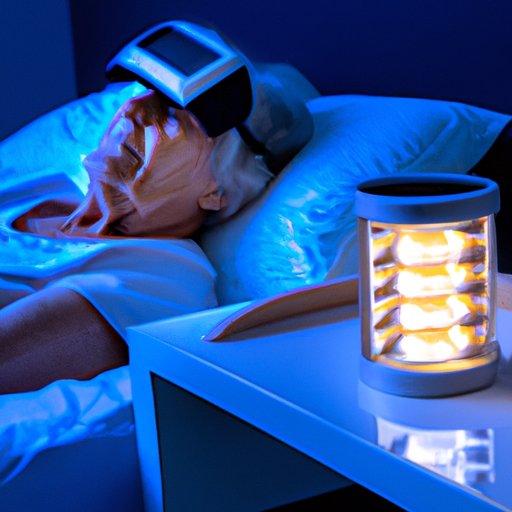Introduction
Dementia is a term used to describe a group of symptoms that can affect an individual’s mental abilities and functioning. It is typically associated with aging, but can also occur in younger individuals. Common symptoms of dementia include memory loss, difficulty with language or communication, difficulty with problem solving, changes in mood and behavior, and difficulty with daily activities. One less commonly discussed symptom of dementia is insomnia, or difficulty sleeping.
When Insomnia is a Symptom of Dementia
Insomnia can be a symptom of dementia, and can have a significant impact on quality of life. Many factors can contribute to insomnia in dementia patients, including decreased levels of melatonin, anxiety, depression, pain, and other medical conditions. In addition, certain medications used to treat dementia-related symptoms can interfere with normal sleep patterns. Some of the most common signs and symptoms of insomnia in dementia patients include difficulty falling asleep or staying asleep, daytime fatigue, irritability, and confusion.

Tips to Help Manage Problems with Sleep in Dementia Patients
There are several strategies that can be used to help manage problems with sleep in dementia patients. Establishing a routine can help to regulate sleep patterns and create a sense of familiarity and security. Setting consistent times for meals, activities, and bedtime can help to cue the body when it is time to rest. Creating a relaxing environment can also be beneficial; reducing noise and light levels, avoiding stimulants such as caffeine and nicotine, and limiting exposure to screens before bedtime can all help to promote better sleep.
In addition, utilizing natural remedies such as aromatherapy, herbal teas, and supplements may be helpful. Aromatherapy has been shown to reduce stress and anxiety, while herbal teas can provide a relaxing effect. Supplements such as melatonin, magnesium, and valerian root may also help to induce restful sleep.

Exploring Treatment Options for Sleep Issues Associated with Dementia
Medication may also be prescribed to help manage sleep issues associated with dementia. Sedatives, hypnotics, and antidepressants are commonly prescribed to help induce sleep, although they should only be used under the guidance of a healthcare professional. Cognitive Behavioral Therapy (CBT) is another option that can help to address underlying issues related to insomnia in dementia patients. CBT can help to identify and modify unhelpful thoughts and behaviors that may be contributing to sleep disturbances. Light therapy is also sometimes recommended for dementia patients suffering from insomnia.

How Family Caregivers Can Help With Sleep Difficulties in Dementia Patients
Family caregivers play an important role in helping dementia patients manage their sleep difficulties. Developing a support system to provide assistance and emotional comfort can be beneficial. Offering reassurance and understanding can also help to reduce stress and anxiety. Reducing stimuli in the evenings and providing a calming atmosphere can also help to promote better sleep.
Examining the Relationship Between Dementia and Sleep Disorders
In some cases, sleep disorders such as sleep apnea and restless legs syndrome may be contributing to insomnia in dementia patients. Sleep apnea is a disorder characterized by pauses in breathing during sleep that can lead to disturbed sleep and fatigue. Restless legs syndrome is a neurological disorder that causes an uncomfortable sensation in the legs that can make it difficult to fall asleep or stay asleep.
Conclusion
Sleep issues are a common symptom of dementia, and can have a significant impact on quality of life. Establishing a routine, creating a relaxing environment, utilizing natural remedies, and exploring treatment options such as medication, cognitive behavioral therapy, and light therapy can all help to manage and treat sleep issues associated with dementia. Family caregivers can also provide valuable support and assistance in managing sleep difficulties in dementia patients. Finally, examining the relationship between dementia and sleep disorders such as sleep apnea and restless legs syndrome can help to identify and address underlying causes of insomnia.
For those impacted by dementia-related sleep issues, it is important to seek professional advice and guidance. Working with a healthcare team to develop an individualized care plan can help to ensure that the best possible outcome is achieved.


